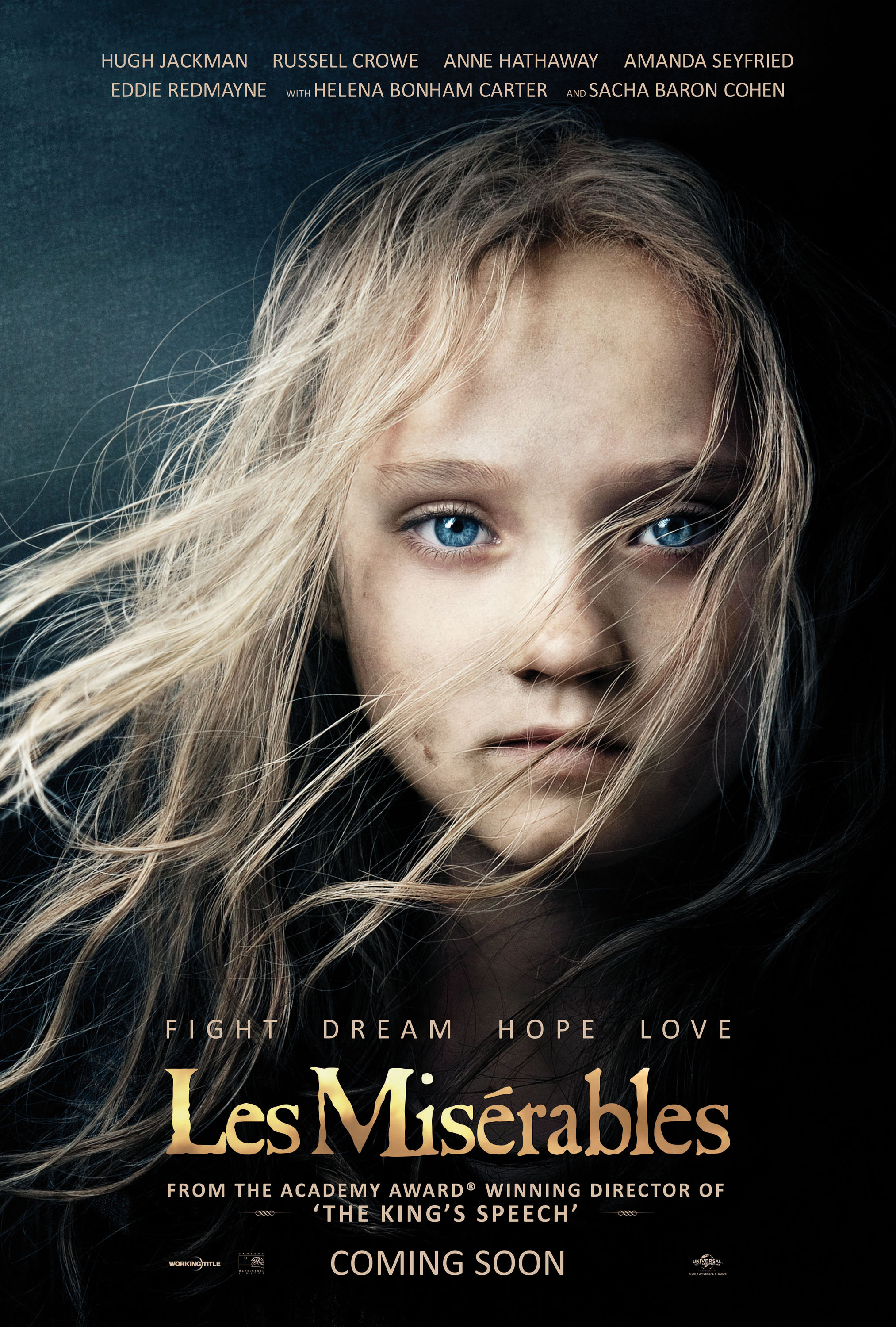 Les Misérables
Directed by: Tom Hooper
Cast: Hugh Jackman, Russell Crowe, Anne Hathaway, Eddie Redmayne, Amanda Seyfried, Samantha Barks
Running Time: 2 hr 37 mins
Rating: PG-13
Release Date: December 25, 2012
Les Misérables
Directed by: Tom Hooper
Cast: Hugh Jackman, Russell Crowe, Anne Hathaway, Eddie Redmayne, Amanda Seyfried, Samantha Barks
Running Time: 2 hr 37 mins
Rating: PG-13
Release Date: December 25, 2012
PLOT: A former prisoner (Jackman) in revolution-hungry 1800s France who broke parole tries to elude the determined policeman Javert (Crowe) while caring for a girl (Seyfriend) orphaned by her tragic mother (Hathaway). Adapted from the musical inspired by the novel by Victor Hugo.
WHO'S IT FOR? If you're a fan of the musical, a viewing of this film is a no-brainer, as the magnitude and effort within this movie is bound to make it a top favorite for some. Those who are unfamiliar with musicals will likely enjoy taking the plunge into the big experience of Les Misérables, but all should be aware - the music never stops.
OVERALL
Director Tom Hooper, showing off his visual guns that made his former Oscar-winner The King's Speech such a hot commodity to the Academy's pool of voters, proves to be a fitting choice for a film adaptation of such a story. His own blaring style working well within the magnitude of this musical, and the intimacy supported by its solos.
Like with The King's Speech, Hooper has his actors taking up one-third of the frame as they perform, their only visual accompaniment the empty space to the side of them. With this, the characters' loneliness feels all the more resonant, and the film feels all the more of its own style, rather than looking like it was assembled by someone intent on remaking the theatrical experience. Instead, Hooper highlights one of the differences between film and theater, with the film audience given nothing to focus on but the raw emotion, with no distraction of the set, and with the non-theatrical bonus of close-ups. Here, Hooper brings the emotion of the idea of a musical to another level, with his dedication to creating memorable performances and then drawing complete attention to them with cameras that get right into a performer's weeping face.
For anyone interested in musicals, performance, and an actor who once sang "I'm Wolverine!" at the Oscars, Jackman is worth the price of movie admission, especially for anyone curious as to what this Broadway star can do when applying his singing talent to the big screen. He takes his worn down character through a gauntlet, and then some, moving from weary slave prisoner on the verge of death to cleaned up success, and back again. Matching the level needed for such a character to carry the story through its many chapters, Jackman acts here like he is ready for this role to kill him, which is exactly what a story like Les Misérables needs.
Hathaway too, in her limited amount of time, (yet one that is certainly friendly to "Best Supporting Actress") completely tosses herself into the dark pit that is the role of the ill-fated Fantine, expressing deep moments of anguish in her performance of "I Dreamed A Dream." She tackles such an challenge with the skill of an emotional heavyweight, taking her emotion into unbelievable territory, where her tears and trembling voice are so raw that the audience has nothing to assume that Hathaway has either gone wackadoo, or is showing again that she is a great actress. Clutching this monologue as if it had been written exclusively for her, and that afterward the sheet music would then be locked in a vault forever, the actress' actress Hathaway achieves a level of frailty we haven't yet seen from her, despite her previous interest in emotionally demanding acting parts, that now all seem like practice for what she has performed here.
Together, Hathaway and Jackman grab the proverbial bar of expectation and raise it high for the rest of the story, which the other actors can't seem to reach. Though the operatic dissonant relationship between Jean Valjean and Russell Crowe's Javert does prove to be compelling opera as it weaves throughout the rest of the story, the film's second act focus on the story of rich pretty boy Marius (Eddie Redmayne, whose singing voice is 45 percent Kermit the Frog) falling for Cosette (Amanda Seyfried) at first sight doesn't register nearly the same amount of urgency, feeling like a silly problem that doesn't fit into the story's near-apocalyptic presentation of revolutionary France. A love triangle created with sweet Eponine (Samantha Barks) just makes the situation more emotionally bloated, and Marius all the more annoying. A revolution then happens, and it is handled with the same facetiousness of a love story in which characters fall in love through first sight - more fitting to musicals than the operatic reality achieved in the first act.
Despite this, Les Misérables still blasts away by one helluva soundtrack, one blessed with sweet moments of harmony and string arrangement. The catchiness of songs like "Do You Hear the People Sing?" and "On My Own" does a sufficient job of patching up any areas that need more tightness — if the emotion within the story seems in need of a boost, at least one can definitely hear it in the music itself.
FINAL SCORE: 7/10

